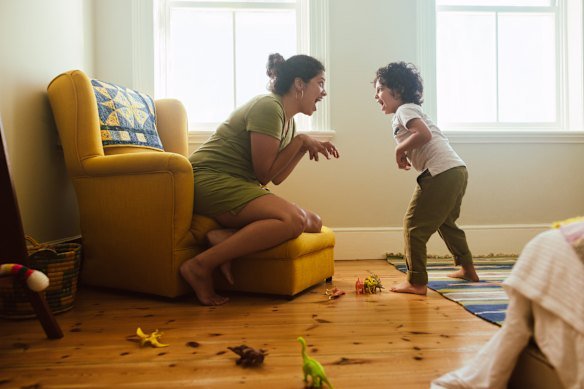“The evidence on childcare in the first 3 years indicates that, for children who are not disadvantaged in their home environment, high-quality childcare has no strong effects on cognitive and language development,” the AIHW found, correcting the idea that early childcare is educationally beneficial for the majority of children.
But, “in contrast, poor quality childcare can produce deficits in language or cognitive development”.
Would younger children be better off being looked after at home by family members? Credit: Getty Images
“There is also evidence,” the AIHW paper continues, “that high levels of attendance at childcare, particularly group care in the first 2 years, could elevate the risk for developing antisocial behaviour (Melhuish, 2004). In the United Kingdom it was reported, however, that informal childcare by relatives at a young age is associated with improved social development.”
And yet this paper has been used to argue that children who attend childcare academically outperform their peers as teenagers. That seems to be the conclusion because the AIHW notes an OECD study that found that “reading assessment results of 15-year-old students in most countries who had attended pre-primary or preschool for more than a year outperformed those who had not attended”.
Of course, an adult reader who has attended preschool or pre-primary might be expected to have the reading comprehension to understand that the age groups clustered within the years from zero to five respond very differently to the “early childhood education” environment. Advocates and policymakers, those closest to the levers of power, could take from these studies that while pre-primary may be beneficial, centre-based care for younger ages might need to be reconsidered and other alternatives sought. There’s no mother-shaming here, but a good whack of shame for lazy policy.
On cue, even in the face of “systemic” physical and sexual abuse, and another especially shocking childcare scandal, the advocates and policymakers are locking in behind the existing model instead of questioning its structure. Instead, the tepid AI-like solution is “more regulation”. And more, and more.
Loading
The response is an understandable lifeline for parents. We are deeply invested in the system as it stands because it is the only model of childcare which government has shown itself prepared to make financially viable for parents. It may be a misery for babies, the long hours apart may not be the family life the parents dream of, care by strangers may not even be inherently safe. But it’s ours. It’s the only system we have. Yes, I’ve used it too.
But we have to recognise that it is flawed. And that it may never be unflawed. To the point that more regulation – which is the easy, catch-all way of saying that we’ve got no idea what to do about this mess – might never improve things enough to protect helpless infants. Perhaps no amount of staffing ratios, CCTV, personal device bans, training and layers of oversight will make centres a safer environment, let alone a more nurturing one for small babies.
It’s time to go back to the drawing board and give parents more direct control over the people they choose to care for their infants in the years before they start preschool.
Don’t bother asking AI what it thinks about that.
Parnell Palme McGuinness is managing director at campaigns firm Agenda C. She has done work for the Liberal Party and the German Greens.
Read the full article here
